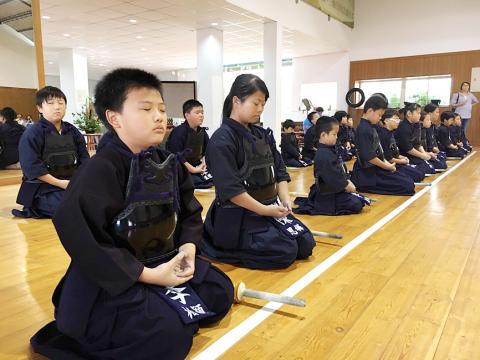The Taiwan Fund for Children and Families’ (TFCF) Changhua branch on Thursday held a ceremony to thank a farmer who donated a truckload of cabbages to help the group purchase protective armor for its kenjutsu team.
Lin Chin-te (林進得) donated a truckload of about 1,000 cabbages early this year after cabbage prices plummeted, it said.
About the same time, the group formed a kenjutsu — Japanese swordsmanship — team for students it was looking after.

Photo: Yen Hung-chun, Taipei Times
Branch supervisor Lin Hui-mei (林惠媚) said it did not have the money to purchase the armor, which costs NT$13,000 apiece, so she had an idea to sell the cabbages to raise funds.
She launched an online fundraiser titled “Raising funds for kenjutsu outfits for TFCF kids,” which sold the cabbages at NT$10 each.
Much to her surprise, all the cabbages were sold in just three days, she said.
The fundraiser attracted the attention of a local columbarium, Damao Biotech, a local bakery, Taipei-based Lei Ying Co and nurses at the Yuanlin Christian Hospital, who donated more items to the group.
TFCF made NT$444,000 from selling the donations, surpassing its goal of NT$400,000, Lin said.
Recounting how the team was founded, Lin said many of the children had behavioral issues and nothing she tried could control them.
She then thought of working with kenjutsu practitioner Chan Chih-yuan (詹智淵) to instruct the children in the martial art.
With Chan’s help, the group established contact with former national kenjutsu team coach Chuang Yi-yuan (莊益源), who agreed to coach them.
Kenjutsu made a significant change in the children, Lin said.
“For example, they used to ignore me when I asked them to mop the floors, but now they take the initiative to clean,” she said.
She said she is proud to see the children focused and competitive while practicing kenjutsu and show good manners outside of class.
“Acts of kindness will be rewarded by more kindness,” Lin said, thanking people for their support.

Taiwan has received more than US$70 million in royalties as of the end of last year from developing the F-16V jet as countries worldwide purchase or upgrade to this popular model, government and military officials said on Saturday. Taiwan funded the development of the F-16V jet and ended up the sole investor as other countries withdrew from the program. Now the F-16V is increasingly popular and countries must pay Taiwan a percentage in royalties when they purchase new F-16V aircraft or upgrade older F-16 models. The next five years are expected to be the peak for these royalties, with Taiwan potentially earning

STAY IN YOUR LANE: As the US and Israel attack Iran, the ministry has warned China not to overstep by including Taiwanese citizens in its evacuation orders The Ministry of Foreign Affairs (MOFA) yesterday rebuked a statement by China’s embassy in Israel that it would evacuate Taiwanese holders of Chinese travel documents from Israel amid the latter’s escalating conflict with Iran. Tensions have risen across the Middle East in the wake of US and Israeli airstrikes on Iran beginning Saturday. China subsequently issued an evacuation notice for its citizens. In a news release, the Chinese embassy in Israel said holders of “Taiwan compatriot permits (台胞證)” issued to Taiwanese nationals by Chinese authorities for travel to China — could register for evacuation to Egypt. In Taipei, the ministry yesterday said Taiwan

‘LIKE-MINDED PARTNER’: Tako van Popta said it would be inappropriate to delay signing the deal with Taiwan because of China, adding he would promote the issue Canadian senators have stressed Taiwan’s importance for international trade and expressed enthusiasm for ensuring the Taiwan-Canada trade cooperation framework agreement is implemented this year. Representative to Canada Harry Tseng (曾厚仁) in an interview with the Central News Agency (CNA) said he was increasingly uneasy about Ottawa’s delays in signing the agreement, especially as Ottawa has warmed toward Beijing. There are “no negotiations left. Not only [is it] initialed, we have three versions of the text ready: English, French and Mandarin,” Tseng said. “That tells you how close we are to the final signature.” Tseng said that he hoped Canadian Prime Minister Mark Carney

POSITIVE DEVELOPMENT: Japan and the US are expected to hold in-depth discussions on Taiwan-related issues during the meeting next month, Japanese sources said The holding of a Japan-US leaders’ meeting ahead of US President Donald Trump’s visit to China is positive news for Taiwan, former Japan-Taiwan Exchange Association representative Hiroyasu Izumi said yesterday. After the Liberal Democratic Party’s landslide victory in Japan’s House of Representatives election, Japanese Prime Minister Sanae Takaichi is scheduled to visit the US next month, where she is to meet with Trump ahead of the US president’s planned visit to China from March 31 to April 2 for a meeting with Chinese President Xi Jinping (習近平). Japan and the US are expected to hold in-depth discussions on Taiwan-related issues during the